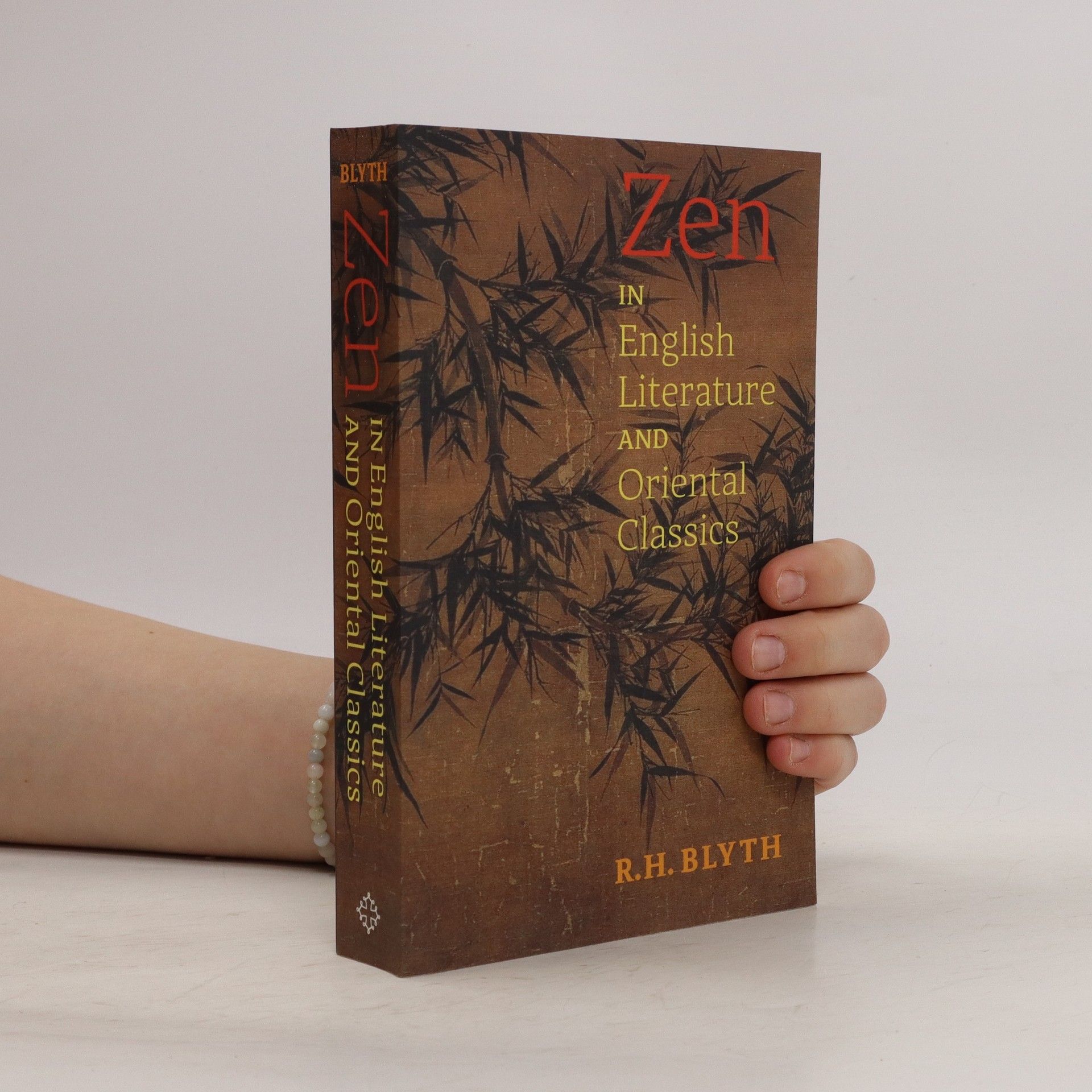Focusing on Zen philosophy, this work explores the essence of self-enlightenment and inner reasoning that shaped Japan's history. Reginald Horace Blyth aims to convey the true nature and mindset of Zen, guiding readers toward a deeper understanding of their inner selves and their connection to the universe. Through his insightful approach, Blyth invites an awakening of awareness, enriching the reader's perspective on life and existence.
R. H. Blyth Volgorde van de boeken (chronologisch)






Reginald Horace Blyth's work offers a profound exploration of haiku, emphasizing its unique ability to convey fleeting moments of perception. Renowned for his four-volume anthology, Blyth curates a selection of exceptional poems that reflect the history of this poetic form, showcasing its masters alongside lesser-known voices. His insights into the motivations behind haiku provide a comprehensive understanding of its evolution, celebrating both its triumphs and challenges while revealing its power to express the inexpressible.
Reginald Horace Blyth's work offers a profound exploration of haiku, showcasing its essence through selected outstanding poems. His anthology captures the historical fluctuations of this poetic form, emphasizing its masters and failures while revealing its capacity to convey deep emotions and moments of clarity. Blyth's unique perspective as a Westerner enhances the understanding of haiku, making it accessible and appreciated for its ability to express the inexpressible. This collection serves as a pivotal resource for anyone interested in the rich tapestry of haiku literature.
Focusing on Zen philosophy and its historical significance in Japan, Reginald Horace Blyth explores the essence of self-enlightenment and inner reasoning. Through his insightful volumes, he aims to convey the true nature of Zen, guiding readers toward a deeper understanding of their inner selves and their connection to the universe. Blyth's work serves as an enlightening journey into the principles of Zen, fostering an awakening of awareness and personal reflection.
Never before published letters and uncollected short writings of R. H. Blyth, champion of Zen and the person who brought haiku to the world. Poetry and Zen assembles a remarkable literary feast: the letters, articles, translations, reviews, and selections from the papers of Reginald Horace Blyth (1898–1964). Following on the landmark success of Zen in English Literature and Oriental Classics (1942), Blyth’s voluminous writings on Zen, Japanese culture, and the Japanese verse forms haiku and senryū captured the imagination of English-speaking readers in the decades following World War II. His enlightening wit and inimitable style struck a particularly sensitive chord in the artistic community, providing inspiration to many poets and writers and helping to kindle global interest in Zen and haiku. Blyth’s penetrating insights on these topics in a series of books published between 1942 and 1970 helped lay the foundation for the remarkable expansion of Zen outside of East Asia, as well as the popularization of haiku as an international verse form that took place after his death. Poetry and Zen is the first collection of Blyth’s letters and short writings. The generous array of Blyth‘s literary output and personal writing on display here showcases the wide-ranging interests and brilliant mind of a pivotal figure in the history of modern Zen and Japanese poetry.
Reginald Horace Blyth's work significantly contributed to the appreciation of haiku and Zen philosophy in the West. A British scholar who spent much of his life in Japan, he became an authority on Japanese poetry. His four-volume haiku anthology showcases the finest works of Japan's haiku masters, paired with his insightful commentary. This collection serves as a vital resource for English-speaking audiences, illuminating the essence and spirit of haiku in an accessible manner, reflecting Blyth's profound admiration and understanding of the art form.
Reginald Horace Blyth, a key figure in introducing haiku and Zen philosophy to the West, dedicated much of his life to Japan, where he taught English and developed a profound appreciation for Japanese poetry. His four-volume haiku anthology is revered among enthusiasts, showcasing the finest works of Japan's haiku masters alongside Blyth's insightful commentary. This collection captures the essence and spirit of haiku, making it accessible and meaningful for English-speaking audiences.
Reginald Horace Blyth played a pivotal role in introducing haiku and Zen philosophy to the West, drawing from his extensive experience in Japan as an English professor and cultural liaison. His four-volume haiku anthology is a vital resource for English-speaking audiences, showcasing the masterpieces of Japanese haiku alongside his insightful commentary. Blyth's work captures the essence and spirit of this unique art form, making it more accessible and appreciated by those unfamiliar with its cultural roots.
Reginald Horace Blyth significantly contributed to the introduction of haiku and Zen philosophy to the West. Having spent much of his life in Japan as an English professor, he developed a profound appreciation for Japanese poetry. His four-volume haiku anthology serves as a vital resource for English-speaking readers, showcasing the masterpieces of Japan's haiku masters along with Blyth's insightful commentary. This work captures the essence and spirit of haiku, making it more accessible to Western audiences than ever before.
Zen in English Literature and Oriental Classics
- 482bladzijden
- 17 uur lezen
It was R.H Blyth's belief that "all that is good in European literature and culture is simply and solely that which is in accordance with the Spirit of Zen." He thereafter applied himself to the task of searching the writings of East and West in an attempt to discover that Spirit. Zen in English Literature and Oriental Classics embraces the classical literature of China and Japan and the whole extent of English literature, with numerous quotations not only from English but also from French, German, Italian, and Spanish writing. Don Quixote has a chapter all to himself, and the author considers him possibly the purest example in all of world literature of a man who lives by Zen. In English, the Zen attitude toward life is found most consistently in Shakespeare, Wordsworth, Dickens, and Stevenson. This book is essential reading for anyone interested in Zen, haiku, or indeed English literature.